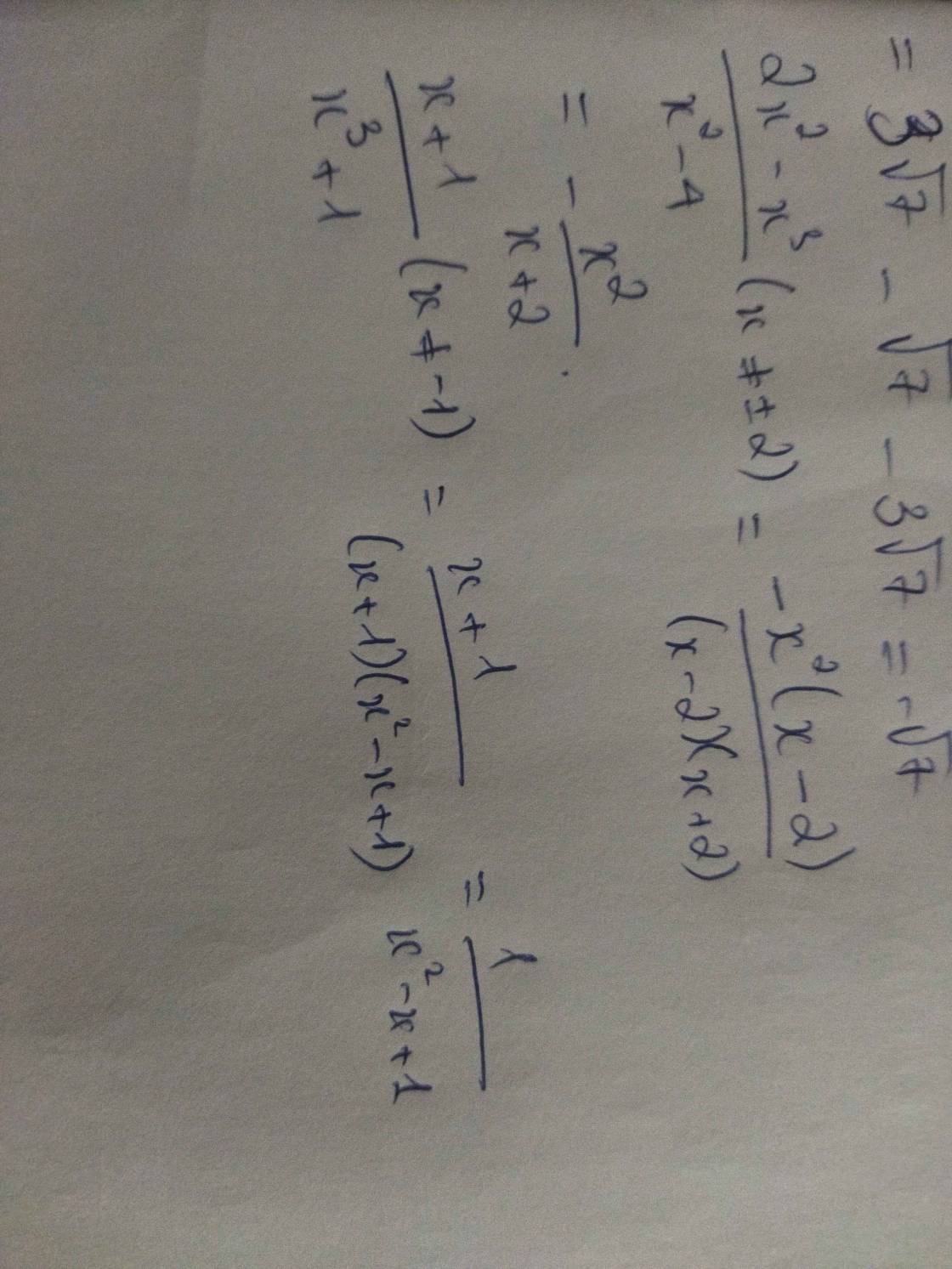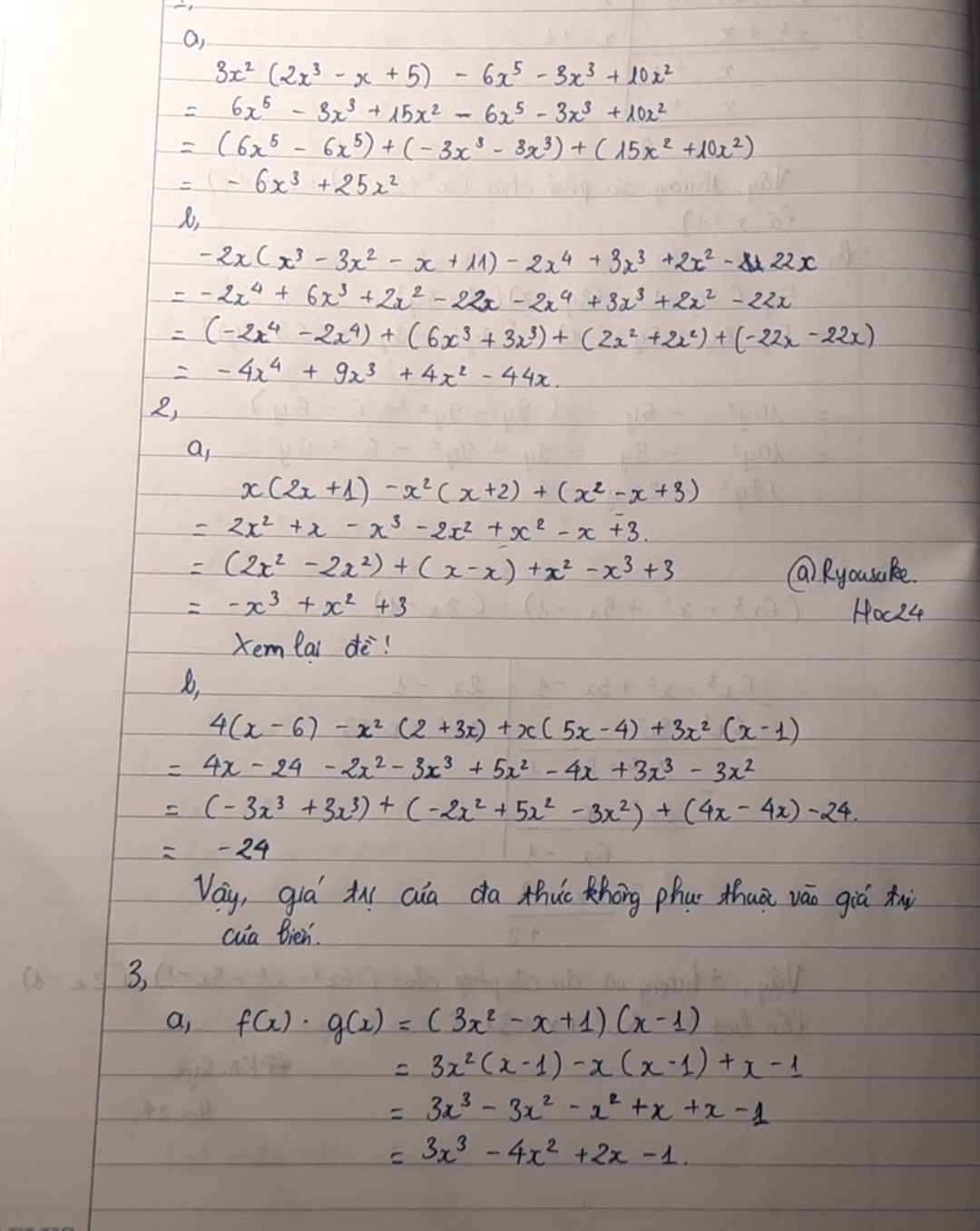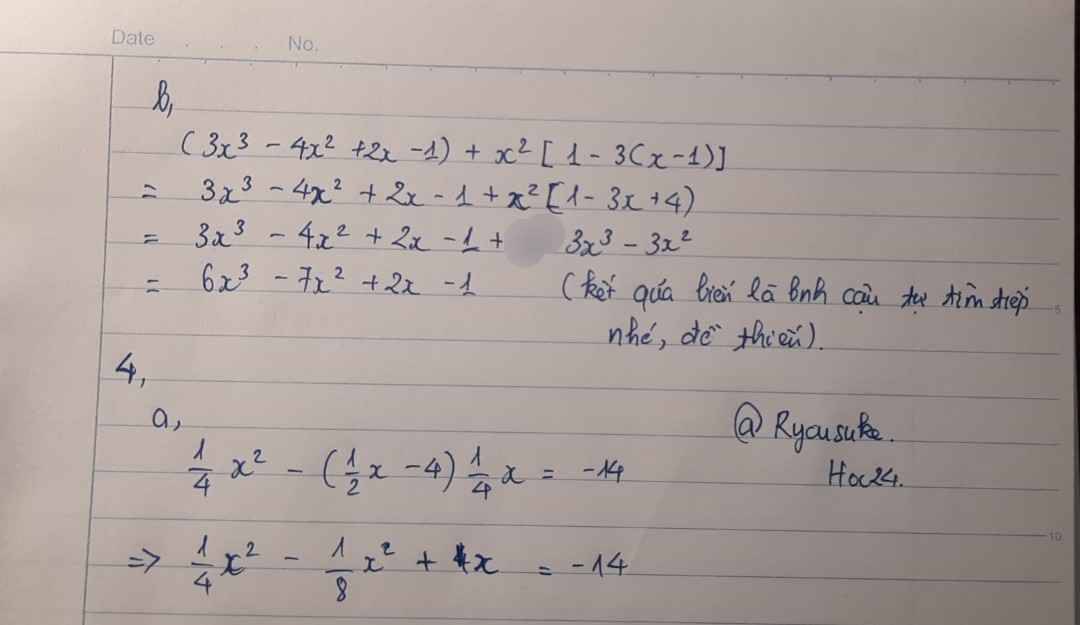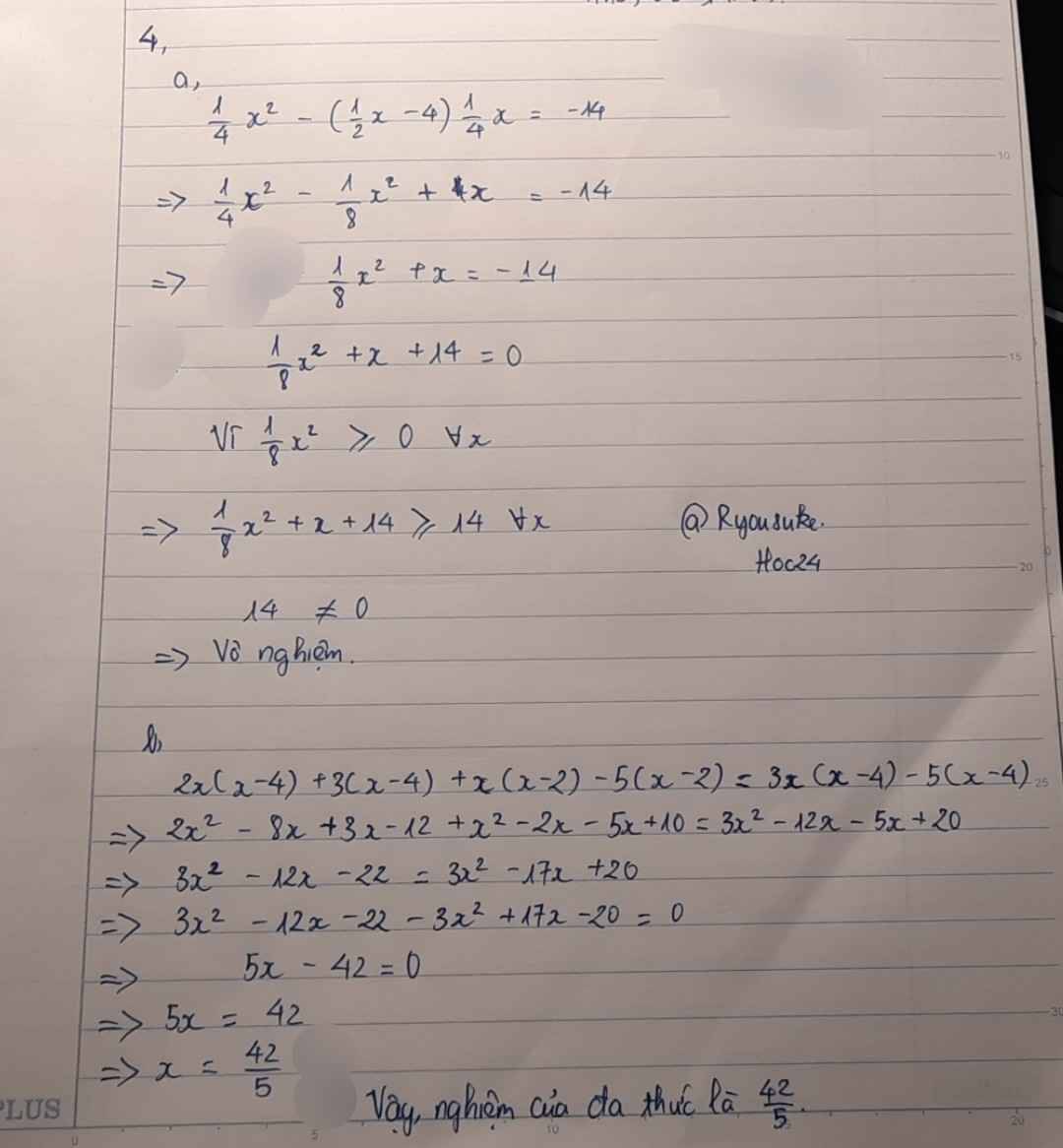Rút gọn phân thức sau:( x/2x-2)+(x2+1/2-2x2)
Hãy nhập câu hỏi của bạn vào đây, nếu là tài khoản VIP, bạn sẽ được ưu tiên trả lời.


\(a,M=\dfrac{\left(x-\sqrt{2}\right)^2}{\left(x-\sqrt{2}\right)\left(x+\sqrt{2}\right)}=\dfrac{x-\sqrt{2}}{x+\sqrt{2}}\\ b,N=\dfrac{x+\sqrt{5}}{\left(x+\sqrt{5}\right)^2}=\dfrac{1}{x+\sqrt{5}}\)
\(N=\dfrac{x+\sqrt{5}}{x^2+2x\sqrt{5}+5}=\dfrac{1}{x+\sqrt{5}}\)

ĐKXĐ: \(x\ne\pm2\)
\(\dfrac{2x^2-x^3}{x^2-4}=\dfrac{x^2\left(2-x\right)}{\left(x-2\right)\left(x+2\right)}=\dfrac{-x^2\left(x-2\right)}{\left(x-2\right)\left(x+2\right)}\)
\(=\dfrac{-x^2}{x+2}\)
\(---\)
ĐKXĐ: \(x\ne-1\)
\(\dfrac{x+1}{x^3+1}=\dfrac{x+1}{\left(x+1\right)\left(x^2-x+1\right)}=\dfrac{1}{x^2-x+1}\)

a) 2x(x+3) – 3x2(x+2) + x(3x2 + 4x – 6)
= (2x . x + 2x . 3) – (3x2 . x + 3x2 . 2) + (x . 3x2 + x . 4x – x . 6)
= 2x2 + 6x – (3x3 + 6x2) + (3x3 + 4x2 - 6x)
= 2x2 + 6x – 3x3 – 6x2 + 3x3 + 4x2 - 6x
= (– 3x3 + 3x3 ) + (2x2 - 6x2 + 4x2 ) + (6x – 6x)
= 0 + 0 + 0
= 0
b) 3x(2x2 – x) – 2x2(3x+1) + 5(x2 – 1)
= [3x . 2x2 + 3x . (-x)] – (2x2 . 3x + 2x2 . 1) + [5x2 + 5 . (-1)]
= 6x3 – 3x2 – (6x3 +2x2) + 5x2 – 5
= 6x3 – 3x2 – 6x3 - 2x2 + 5x2 – 5
= (6x3 – 6x3 ) + (-3x2 – 2x2 + 5x2) – 5
= 0 + 0 – 5
= - 5

Bài 1:
a) Ta có: \(P=1+\dfrac{3}{x^2+5x+6}:\left(\dfrac{8x^2}{4x^3-8x^2}-\dfrac{3x}{3x^2-12}-\dfrac{1}{x+2}\right)\)
\(=1+\dfrac{3}{\left(x+2\right)\left(x+3\right)}:\left(\dfrac{8x^2}{4x^2\left(x-2\right)}-\dfrac{3x}{3\left(x-2\right)\left(x+2\right)}-\dfrac{1}{x+2}\right)\)
\(=1+\dfrac{3}{\left(x+2\right)\left(x+3\right)}:\left(\dfrac{4}{x-2}-\dfrac{x}{\left(x-2\right)\left(x+2\right)}-\dfrac{1}{x+2}\right)\)
\(=1+\dfrac{3}{\left(x+2\right)\left(x+3\right)}:\dfrac{4\left(x+2\right)-x-\left(x-2\right)}{\left(x-2\right)\left(x+2\right)}\)
\(=1+\dfrac{3}{\left(x+2\right)\left(x+3\right)}\cdot\dfrac{\left(x-2\right)\left(x+2\right)}{4x+8-x-x+2}\)
\(=1+3\cdot\dfrac{\left(x-2\right)}{\left(x+3\right)\left(2x+10\right)}\)
\(=1+\dfrac{3\left(x-2\right)}{\left(x+3\right)\left(2x+10\right)}\)
\(=\dfrac{\left(x+3\right)\left(2x+10\right)+3\left(x-2\right)}{\left(x+3\right)\left(2x+10\right)}\)
\(=\dfrac{2x^2+10x+6x+30+3x-6}{\left(x+3\right)\left(2x+10\right)}\)
\(=\dfrac{2x^2+19x-6}{\left(x+3\right)\left(2x+10\right)}\)

Câu 2:
a: \(\Leftrightarrow3x^2+2x-1=0\)
\(\Leftrightarrow\left(x+1\right)\left(3x-1\right)=0\)
\(\Leftrightarrow\left[{}\begin{matrix}x=-1\\x=\dfrac{1}{3}\end{matrix}\right.\)
b: \(\Leftrightarrow x^3-4x-x^3-8=4\)
hay x=-3

2:
a: \(9x^2-1=\left(3x\right)^2-1=\left(3x-1\right)\left(3x+1\right)\)
b: \(2\left(x-1\right)+x^2-x\)
\(=2\left(x-1\right)+x\left(x-1\right)\)
\(=\left(x-1\right)\left(x+2\right)\)
c: \(3x^2+14x-5\)
\(=3x^2+15x-x-5\)
\(=3x\left(x+5\right)-\left(x+5\right)=\left(x+5\right)\left(3x-1\right)\)
3:
a: \(2x\left(x-1\right)-2x^2=4\)
=>\(2x^2-2x-2x^2=4\)
=>-2x=4
=>x=-2
b: \(x\left(x-3\right)-\left(x+2\right)\left(x-1\right)=5\)
=>\(x^2-3x-\left(x^2+x-2\right)=5\)
=>\(x^2-3x-x^2-x+2=5\)
=>-4x=3
=>x=-3/4
c: \(4x^2-25+\left(2x+5\right)^2=0\)
=>\(\left(2x-5\right)\left(2x+5\right)+\left(2x+5\right)^2=0\)
=>\(\left(2x+5\right)\left(2x-5+2x+5\right)=0\)
=>4x(2x+5)=0
=>\(\left[{}\begin{matrix}x=0\\x=-\dfrac{5}{2}\end{matrix}\right.\)





